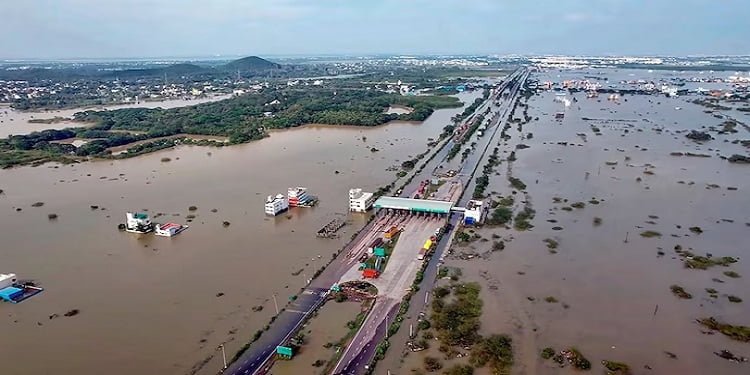Prime Minister Narendra Modi Approves Ambitious Urban Flood Mitigation Project for Chennai

Chennai, once again, finds itself grappling with the devastating effects of floods, marking the third such calamity to besiege the metropolis in less than a decade. The city’s struggle with extreme weather events has brought to light the increasing vulnerability of India’s urban landscape to sudden and severe flooding due to excessive rainfall.
In response to the urgent need for effective flood management solutions, Prime Minister Narendra Modi has sanctioned an ambitious urban flood mitigation project for Chennai, with a budget allocation of Rs. 561.29 crore under the National Disaster Mitigation Fund (NDMF). The ‘Integrated Urban Flood Management activities for Chennai Basin Project’ represents a proactive measure to address the challenges posed by urban flooding. It is designed to enhance Chennai’s resilience to such natural disasters by implementing comprehensive flood management strategies.
The project will focus on improving the city’s infrastructure to better manage excessive rainwater, thereby reducing the risk of flooding and minimizing the impact on residents’ lives and livelihoods. This project is the first of its kind, setting a precedent for urban flood mitigation efforts across India. It is expected to serve as a model for developing a broader framework that can be adapted to safeguard other metropolitan areas facing similar risks.
The announcement comes at a critical time as Chennai confronts the aftermath of the recent deluge, which has caused widespread disruption. The city’s airport has been inundated, leading to the suspension of flight operations, while waterlogged streets have paralyzed transportation and affected daily life. The National Disaster Response Force (NDRF) and other agencies are actively engaged in rescue and relief operations, highlighting the urgency of implementing long-term flood management solutions.
Chennai’s vulnerability to flooding can be attributed to several factors. Rapid urbanization and inadequate drainage systems have contributed to the city’s susceptibility to waterlogging during heavy rainfall. Climate change has also played a role, with extreme weather events becoming more frequent and intense. The urban flood mitigation project aims to address these underlying issues and build a more resilient Chennai.
The project will encompass various components, including the improvement of stormwater drains, the construction of retention ponds, the development of flood forecasting and early warning systems, and the implementation of measures to enhance the city’s capacity to absorb and manage excessive rainwater. Additionally, the project will focus on community engagement and awareness programs to educate residents about flood preparedness and response.
By adopting a holistic approach, the urban flood mitigation project aims to create a sustainable and long-lasting solution to Chennai’s flood woes. It recognizes the need for collaboration between various stakeholders, including government agencies, urban planners, engineers, and the local community. The project’s success will depend on effective coordination and the active participation of all stakeholders.
Furthermore, the project’s impact extends beyond Chennai. As the first of its kind in India, it will serve as a model for other cities grappling with similar challenges. By documenting and sharing best practices, the project will contribute to the development of a comprehensive framework for urban flood management across the country.
Prime Minister Narendra Modi’s approval of the urban flood mitigation project for Chennai demonstrates the government’s commitment to addressing the pressing issue of urban flooding. By investing in proactive measures, the project aims to protect lives, safeguard infrastructure, and minimize the economic impact of floods. It is a significant step towards building resilient cities that can withstand the challenges posed by climate change and extreme weather events.
In conclusion, the urban flood mitigation project for Chennai, with a budget allocation of Rs. 561.29 crore, represents a crucial initiative to enhance the city’s resilience to flooding. By implementing comprehensive flood management strategies and improving infrastructure, the project aims to reduce the risk of flooding and minimize its impact on residents’ lives and livelihoods. This project sets a precedent for urban flood mitigation efforts across India and serves as a model for other cities facing similar risks. Prime Minister Narendra Modi’s approval underscores the government’s commitment to addressing the urgent need for effective flood management solutions.